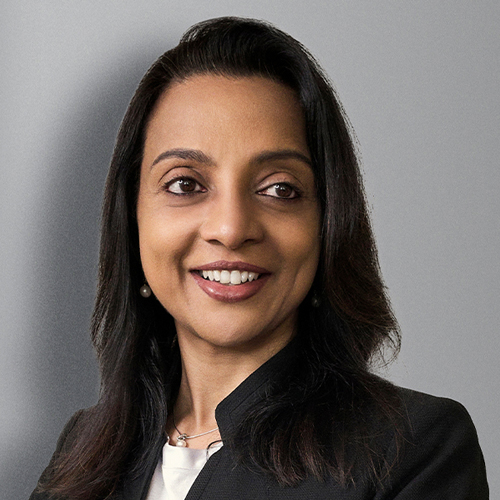Please update your browser.

Sandhya Sridharan
Software Engineer, Head of Enterprise Toolchain
As the daughter of a mechanical engineer, Sandhya Sridharan spent much of her childhood around the heavy machinery of a paper mill. While other kids spent their free time climbing trees and playing cricket, Sridharan was busy climbing turbines and learning the ropes of the facility. “We didn’t have laws mandating hard hats or any other safety standards like we have now, so those factories were my playground.”
Although the field of mechanical engineering piqued her interest young, Sridharan’s dad steered her towards computer science in college where she discovered her new passion. “From that moment, I knew I would work in technology,” she says. “It’s all I know how to do.”
True to her word, Sridharan is still pursuing her passion today as a senior leader in JPMorgan Chase’s Silicon Valley offices where she leads a team of software engineers and product managers. In addition, she serves on the advisory board of Women Who Code, a nonprofit organization which supports women in technology. She believes that diversity in the workplace means various approaches to problem solving, which leads to the best possible outcome. She explains, “In technology, we often solve complex engineering problems, so having that variation and diversity of thinking is critical to helping us come up with the right decision.”
What does success look like to you?
Success to me is to have the courage of my convictions to turn a vision into reality. It’s making today better than yesterday. My job—building products that improve and simply a customer’s life—is an example of that.
Who has been the biggest influence in your life?
My dad has been one of my biggest influences. He was the chairman and managing director of one of the largest paper manufacturers in Asia. Growing up, I learned from watching his leadership style and his ability to make tough decision. I saw how he managed complex challenges, like building out a new factory. All of that stuck with me.
On the other end of the spectrum is Margaret Thatcher, the first female prime minister of United Kingdom. I admire the way she made decisions in a man's world and led her nation through very difficult times with a very calm demeanor. She was a wife, a mother, and a head of state, and remained highly disciplined, even through very difficult political times. As a teenager, I was very awestruck and very much influenced by her leadership style. That stayed with me as I navigated the professional world later in life.
What do you consider the most valuable piece of advice you've ever received and where did it come from?
Two of the most valuable pieces of advice I’ve received came from my first boss. First, never stop learning. Second, if you want people to look at you as a leader, act like one.
I recently heard something similar on a podcast by Amy Cuddy, who is an American social psychologist. We have all heard the phrase, “fake it until you make it,” But in this podcast, she talks about “fake it until you become it.” Even if you don’t feel confidence or don’t feel that you belong at the table, standing tall and proud and taking a front row seat changes the way people perceive you. If you do it enough times, you feel comfortable and confident and believe that you belong at the table.
What is the biggest obstacle you've overcome in life?
My family is highly educated, but conservative. It was hard for them when I decided to leave my country, by myself, in my early twenties. I mean, a girl in her early twenties who is not married and is traveling to a foreign country? Especially a western culture? In a conservative family 25 years ago, that was uncommon.
When I got to the US, professionally, it was very challenging—especially in engineering, where there were very few women. As I climbed the professional ladder, there were fewer and fewer women at the top. That may not be exactly an obstacle, but it was a challenge that I had to navigate through.
Work-from-home, go to the office or a mix of both?
I like a mix of both. Due to COVID, working from home on a daily basis has had its advantages and disadvantages. I can steal some time during the day with my kids, which has been great. But I miss going into work. I miss the social interactions, face to face white board discussions, grabbing coffee or lunch with my colleagues. Building connections, relationships and trust is key to the success of the team and the organization as a whole.